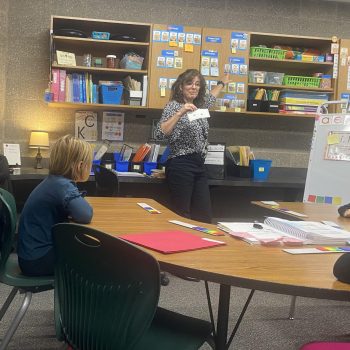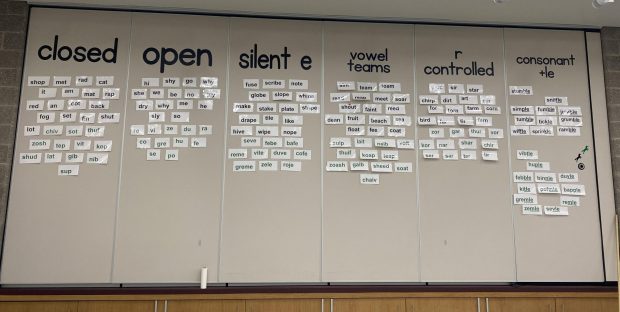POST FALLS — Chelsie Marine frequently read with her two young boys, Carter and Reed.
She hoped it would prepare them for school, but the boys never seemed to pick it up.
Then her oldest Carter was placed in Greensferry elementary’s kindergarten reading intervention program.
It was a game-changer for him, giving him the skills to sound out words. He gained confidence and thrived with the hands-on personalized instruction that set him on a path of reading, and not just reading well, but enjoying it too.
“Learning from someone who knows how to teach a child how to string the letter sounds together really helps,” Marine said. “It was really a big deal for us to see those huge improvements.”
Reading intervention programs exist at all seven elementary schools in the Post Falls School District, which owns some of the best reading scores in the state. The programs are so successful that district leaders intervened to prevent Greensferry’s program from ending last year when its’ funding source dried up.
Here’s how the program works
In a quiet room just off the kindergarten hallway at Greensferry Elementary, Bridget Nigh and paraeducators Heather Coy and Becky Watkins created a reading oasis.
Books line the walls in bins based on grade level down to specific lessons. Each of the instructors sit at the center of semi-circle tables with color-coded folders laid out in front of them as they wait for their first class of the day.
The lessons are planned to the minute. First, the new concept is introduced, then students practice. At the last table, students get a final check for understanding.

Post Falls School District, Out of the state’s 25 largest school districts, had the highest percentage of students reading at grade level last year at 79%, according to results from the Idaho Reading Indicator, a standardized test that students in grade K-3 take each fall and spring.
Based on the same metrics, Post Falls also showed the largest amount of growth in readers from fall to spring with an increase of 20 percentage points.
“The Post Falls School District believes that literacy is fundamental to student achievement,” said Neil Uhrig, chair of the district’s board of trustees. “Students need to be able to read in order to learn and ultimately be successful in life.”
Teachers in Post Falls elementary schools, like Greensferry, have their students take the IRI monthly, instead of just twice a year as required by the state, allowing reading intervention teachers to see more often where a student is improving and where they’re struggling, said Greensferry Principal Kathy Baker.
A child’s reading journey can be seen in their test scores, which are kept in color coded spreadsheets. If a child is struggling consistently, they get additional screening before they’re placed in the reading intervention program.
Each week students’ progress is monitored to see if they’re progressing in the program.”If a child is just really not growing, we’re changing things up based on the data,” Baker said.
That data also helps students who learn reading skills in the classroom. The teacher there uses that data to adjust their lessons too, she said.

Baker also points to the district’s investment in bringing in experts in the science of reading and phonological awareness to help instructors and teachers’ focus on teaching children to recognize and manipulate sounds in spoken language as additional factors in the jump in reading ability.
Reading and literacy is a party of all elements of the school, not just reading lessons, she said.
Baker occasionally leads students through sounding out words phonetically during their lunch period, aided by a giant bullet board.
Continued investment
For a time, the future of reading intervention services at Greensferry Elementary were in jeopardy as the number of families who qualify for free and reduced lunch dwindled. Reading intervention services are often funded by Title 1, a federal program that provides additional support for schools with a high proportion of low income students.
Greensferry lost Title 1 funding for the 2024-25 school year but the Post Falls School District’s Board of Trustees voted to pay for Greensferry’s reading intervention program out of the general fund. All of the other six elementary schools in the district retained their Title 1 qualification.
“The district takes reading so seriously that we are willing to invest in these programs even when the federal government backs out; and our methods are working,” Uhrig said. “Just because Greensferry Elementary School no longer qualifies for federal funding doesn’t mean that magically all of our students can read at grade level; the need for reading intervention remains.”
In a large class setting, Nigh said, students with reading struggles try to fly under the radar. They won’t participate in sounding out a word or choral reading. But in the reading intervention room, it’s a smaller group.
They grow those skills and become more confident, she said.
Amanda Rios’ daughter Catalina, 9, has been in and out of the reading intervention program since first grade.
“Homework was terrible,” Rios recalled. “First grade it was terrible, she never wanted to read.”
Nigh got her moving in the right direction through first and second grades, which sparked Catalina’s imagination. She didn’t need the program in third grade but with bigger words and concepts in fourth grade, Catalina is back in the program, making sure she stays on track, Rios said.
While the struggles to stay on pace pop up, Rios said since that first year Catalina’s love of reading hasn’t wavered.
“She’s reading all different types of books,” Rios said.
Now, a trip to the library is a treat rather than trouble, Rios said.
